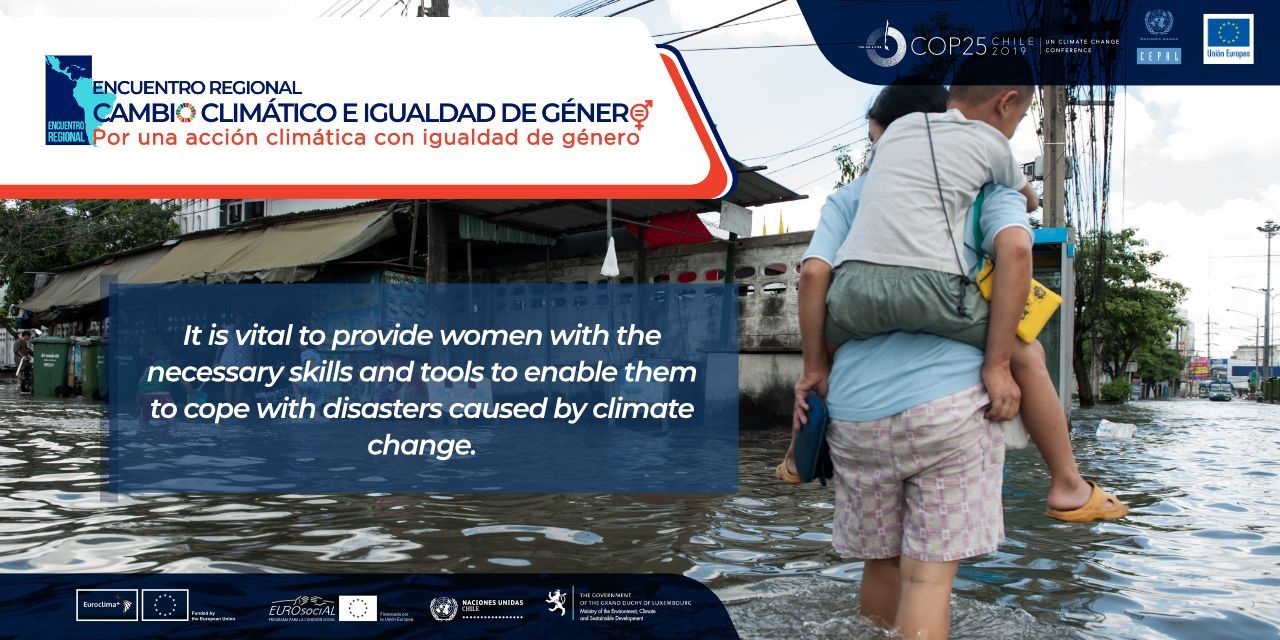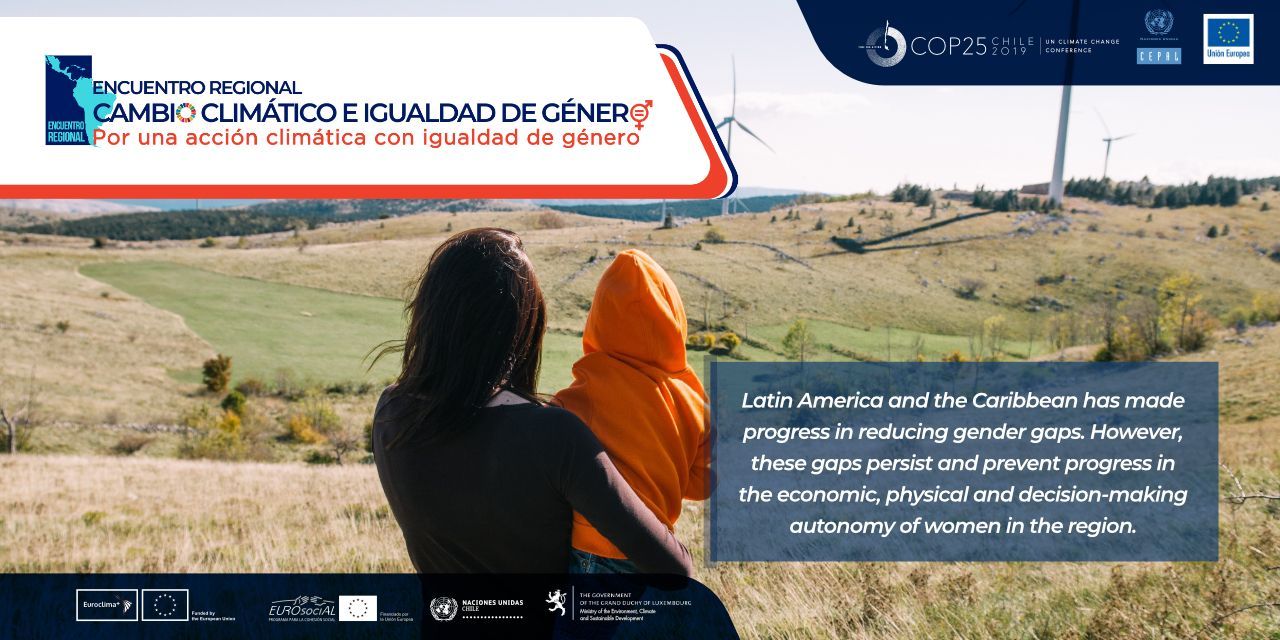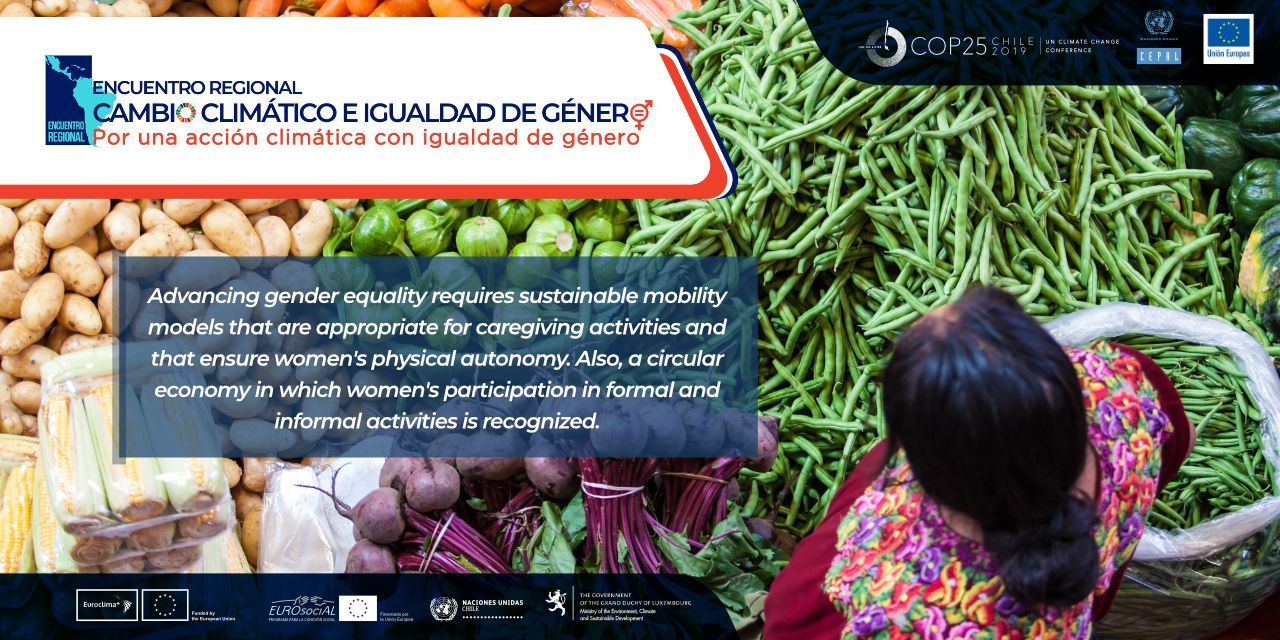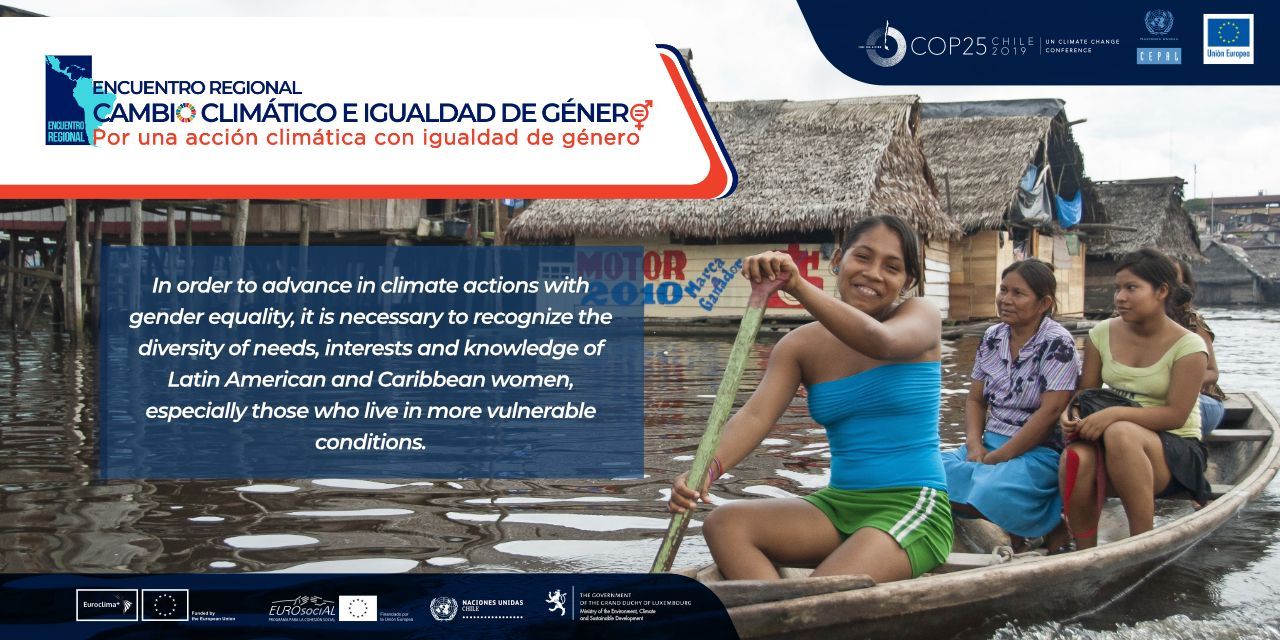Santiago, 30 September 2021. A position paper that will serve as a roadmap to accelerate climate action with gender equality in Latin America and the Caribbean,
is one of the main outcomes of the Regional Meeting on Climate Change and Gender Equality, held virtually during the month of September, which was attended by nearly 60 official representatives from 24 countries in the region and an average of 1700 spectators per session from civil society organisations, academia and the public and private sectors.
This position paper will be presented as a key input to the 26th Conference of the Parties to the United Nations Framework Convention on Climate Change, COP26, which will take place from 1-12 November 2021 in Glasgow, Scotland, to advance the definition of the Lima Work Programme on Gender and its Enhanced Gender Action Plan 2020-2024, adopted during COP20 in Lima and COP23 in Bonn-Fijj, respectively. An enhanced version of these instruments was agreed during COP25, held in December 2019 in Madrid, Spain, under the Presidency of the Government of Chile.
 The Meeting document systematises the best practices, experiences, challenges, and opportunities identified by the countries of Latin America and the Caribbean during the 7 working sessions of the Meeting, related to the integration of the gender approach in the formulation and implementation of national policies for mitigation and adaptation to climate change. It includes aspects such as regulatory frameworks, climate finance, just transition, national and subnational experiences, and bi-regional dialogue with the European Union, among others.
The Meeting document systematises the best practices, experiences, challenges, and opportunities identified by the countries of Latin America and the Caribbean during the 7 working sessions of the Meeting, related to the integration of the gender approach in the formulation and implementation of national policies for mitigation and adaptation to climate change. It includes aspects such as regulatory frameworks, climate finance, just transition, national and subnational experiences, and bi-regional dialogue with the European Union, among others.
The Meeting process allowed for the training of decision-makers in the region on the links between gender and climate change to implement the Lima Work Programme and its strengthened Gender Action Plan, as well as the identification of synergies and alliances between countries in the region and Europe to implement both instruments.
Sessions covered topics such as financing, governance, collection and analysis of climate indicators, experiences in enabling sectors and synergies with other sustainable development agendas, all from the perspective of gender equality in climate change mitigation and adaptation, with the aim of moving towards transformative recovery as a backdrop.
The Meeting also fostered the creation of a multi-sectoral network, which will support the different governments in the region to incorporate a gender equality approach in climate action based on the experiences and lessons learned that have been generated.
"Without women there is no climate action and only with gender equality and a more active and equitable participation of women in decision-making will inclusive, sustainable, and truly effective climate action be possible in Latin America and the Caribbean, said Javier Naranjo, Chile's Deputy Minister of the Environment during the closing of the event, who also highlighted the country's commitment to promote a gender equality approach in its national and international policy.
 For her part, Carole Dieschbourg, Luxembourg's Minister for the Environment, Climate and Sustainable Development, stressed that there is still a long way to go, but that "every step, no matter how small, is important to make rapid progress on the issue and involve everyone".
For her part, Carole Dieschbourg, Luxembourg's Minister for the Environment, Climate and Sustainable Development, stressed that there is still a long way to go, but that "every step, no matter how small, is important to make rapid progress on the issue and involve everyone".
Felice Zaccheo, head of the European Union's Regional Programmes Unit for Latin America and the Caribbean of International Partnerships (DG INTPA) of the European Union, emphasised that women's participation is still a minority in decision-making and the implementation of the solutions that the Latin American and Caribbean region needs to mitigate the effects of climate change, which is why "the European Union maintains gender equality as a guiding principle in its international cooperation".
For her part, Alicia Herbet, special envoy for gender equality at COP26, stressed that gender equality will be one of the emphases of the UK's upcoming presidency of the COP26 climate summit, and that it will be reflected not only in events on the issue, but throughout the conference. "We are committed to making the voices of women and girls heard at COP26, especially the most marginalised ones, who are most impacted by climate change," she said.
Finally, the coordinator of the Regional Meeting, Javiera Zárate Martel, thanked the coordinating team for their dedication to the initiative, as well as the panellists and those who participated on Tuesdays and Thursdays in September. She also called on decision-makers to implement the Gender Action Plan, as well as to integrate civil society and academia to end gender inequalities and move towards sustainable development.
About the meeting
The Government of Chile, in its capacity as Presidency of COP 25, held the Regional Meeting on Climate Change and Gender Equality in September, through its Ministries of the Environment, Foreign Affairs and Women and Gender Equality. The event had the support of the European Union, through its EUROCLIMA+ and EUROsociAL+ programmes, and the technical support of the Economic Commission for Latin America and the Caribbean (ECLAC) as key strategic partners in climate action and to connect the dots between the 2030 Agenda and the Sustainable Development Goals. The meeting also had the collaboration of the United Nations System of Chile and the Grand Duchy of Luxembourg.

The meeting was 100% virtual and took place in 7 sessions throughout the month. The meetings showcased experiences, best practices, challenges, and opportunities for integrating gender equality in climate action in Latin America and the Caribbean and a roadmap for the implementation of the Paris Agreement.
| Session 1 | Session 2 | |
| Session 3 | Session 4 | |
| Session 5 | Session 6 | |
| Session 7 | ||
The road to gender-equal climate action:
|
1991: |
|
The Women's World Congress for a Healthy Planet calls for gender balance in delegations to the UN Conference on Environment and Development. |
|
1995: |
|
The Fourth World Conference on Women sets forth measures for gender equality and the advancement of women in environmental decision-making and sustainable development policies and programmes. |
|
2001: |
|
The United Nations Framework Convention on Climate Change (UNFCCC) documents an increase in women's representation in the Convention's committees, putting gender on the agenda. |
|
2009: |
|
The UNFCCC Women and Gender Constituency brings together 33 civil society organisations to ensure that women's voices and rights are reflected in Convention processes and outcomes. |
|
2012: |
|
Gender is established as a permanent item on the agenda of the climate negotiations. |
|
2014: |
|
The Lima Work Programme on Gender is being developed until 2016. |
|
2015: |
|
|
|
|
2016: |
|
The United Nations Conference on Housing and Sustainable Urban Development, Habitat III, recognises the importance of sustainable, inclusive and gender-sensitive cities. |
|
2017: |
|
The Gender Action Plan is developed |
|
2018: |
|
The CEDAW Committee on the Elimination of Discrimination against Women issues General Recommendation No. 37 on the gender dimension of disaster risk reduction in tackling climate change. |
|
2019: |
|
During COP25, under the Presidency of Chile, the definition of the Lima Work Programme on Gender and its Enhanced Gender Action Plan 2020-2024 is agreed. |
|
2020: |
|
Regional Conference on Women of Latin America and the Caribbean, established as a subsidiary body of ECLAC with UN Women, to identify the regional situation regarding women's autonomy and rights. |
|
2021: |
|
The Generation Equality Forum 2021 brings together decision-makers from around the world and sets out a five-year global plan (2021-2026) to accelerate equality, leadership and opportunities for women and girls. |
|
Regional Meeting on Climate Change and Gender Equality organised by the COP25 Presidency with the support of the United Nations and the European Union. |
EUROCLIMA+
The implementation of EUROCLIMA+ is funded by the European Union, and co-financed by the German federal government through the Federal Ministry for Economic Cooperation and Development (BMZ), the governments of France and Spain through the Ministry of Foreign Affairs, European Union and Cooperation, is carried out according to the "Spirit of Team Europe" under the synergistic work of seven agencies: the Spanish Agency for International Development Cooperation (AECID), the French Development Agency (AFD), the Economic Commission for Latin America and the Caribbean (ECLAC), the German Society for International Cooperation (GIZ), Expertise France (EF), the International and Ibero-America Foundation for Administration and Public Policy (FIIAPP), and the UN Environment Programme.
More information:
Marina Casas, CEPAL: This email address is being protected from spambots. You need JavaScript enabled to view it.

